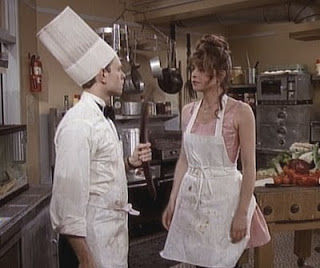
Frasier: Now we can all sit here in the dark and be miserable or we can try to have some fun.
Niles: I'm going to call Maris.
Frasier: Well, Niles has voted. Who votes for fun?
As I hit post 400 and the end of the second leg of our journey, I’m starting to feel I’ve maybe got the hang of this thing. At some point I learned the virtue of mentally outlining what I mean to write before I start putting it down, and I think the pieces I have on the site will be stronger for it, while also making it less of a drain on me. October may see a bit of a slowdown on the FRASIER front because there’s something I want to do for Halloween, but nothing’s in stone.
After the high absurdity of the last episode, “Dark Victory” ends the season on a down-to-Earth note. Like the last season ender it involves all the characters in a situation where they get to look at where they are in their lives and what their goals are, but it also manages a surprisingly deep observation of the psychic cost of listening to other people’s problems.
Frasier’s had a rough week at work and is looking forward to the weekend, but Roz is depressed because she decided to skip her annual family reunion; a brick of cheese sent from home is giving her second thoughts. To cheer her up, Frasier invites her to Martin’s birthday party at his place; unfortunately, that’s quickly degenerating into an argument between dad and Daphne over his unhealthy habits and refusal to exercise. Roz tries to leave early, but then a power outage strands the whole gang in Frasier’s apartment, each with their own problems that, inevitably, Frasier must help them solve. From Niles’ resentment over having a patient leave him (based on advice from Frasier’s show), to Daphne fretting over whether to get her own place or stay with the Cranes, to Roz’s off-and-on homesickness, it’s gonna be a long night.
While this isn’t as much of a recap as “My Coffee With Niles”, the similarities go beyond them both being season finales. Both are built around the idea of a series of interactions between Frasier and each of the other characters in turn, learning a bit more about all of them in the process. A season finale is expected to touch base with all the major players; it’s going to be a while before we see them again and there’s a comfort in knowing where they are when we leave. (The equally valid alternative is to put them in a cliffhanger and make damn well sure we come back to see what happens, and the show will not be averse to taking this route in the future.)
This particular recap ends up mostly being about strengthening relationships. Frasier bonds further with Roz, makes Daphne realize the bond she has with her adopted family, and mends fences with Niles, and generally makes everyone get along by getting them to vent the things that are really making them angry. The blackout provides an opportunity for a cooling-off period, at least after Frasier realizes the game of “I’m the Dullest Person” isn’t going anywhere.
It comes at a cost, though. Frasier’s end speech about the pieces of him he keeps giving away didn’t make a lot of sense to me the first I caught this episode in syndication, but with time and experience I’ve come to realize the truth of it. It’s hard to listen to all the bad things that go on in people’s lives, which is why we’ve invented meaningless pleasant conversation. Sometimes it can’t be avoided, and it’s obviously a good thing to give people a shoulder to cry on, but doing good sometimes just isn’t easy. Frasier can’t really refuse any of the unstated requests for help that come up during the evening, but he insists on his right to sulk a little on his own instead of joining the interesting party downstairs.
So “Dark Victory” ends up having a couple of meanings apart from the movie/play reference. It’s really a Pyrrhic victory, one that comes at a cost to Frasier, but it’s a victory nonetheless. He is a force for good in his friends’ and family’s lives, and he’ll keep on doing so even if it gets hard sometimes. It’s a nice contemplative note to leave the season on, and the willingness to deal with a difficult and sometimes unexamined theme is one of the things that makes FRASIER so very, very excellent.
More to come.
Guest Caller: Shelley Duvall as Caroline
Written by Christopher Lloyd, Linda Morris, and Vic Rauseo
Directed by James Burrows
Aired May 23, 1995
Niles: Nineteen floors down to my car! Garage door's electric! Can't open! Twenty floors back up! Lost count! Bad lady upstairs! Big dog! Need place to die!







